There’s no question that the new generation of structurally bonded sliding doors offer some of the most impressive sightlines and aesthetics on the market. But they also come with added complexity, risk, and cost—especially when it comes to servicing or replacing glass in future.
This article explains exactly what structurally bonded sliding doors are, the pros and cons, how to recognise them, and whether a bonded system is right for your project. We also highlight alternative options that offer similar aesthetics without the complexity or extra cost.
What are Structurally Bonded Sliding Doors?
Structurally bonded sliding doors have been available in the UK since around 2017. That means many of the earliest doors are still within their ten-year warranty period—and many homeowners are only just starting to understand the implications of buying this type of system.
Structurally bonded sliding doors are built around the glass. The glass is permanently bonded to the surrounding aluminium frame using specialist adhesives. This isn’t a clip-in glazing bead or removable panel—the glass is part of the door’s structural strength.
On non-bonded doors the glass isn’t as important in the door’s structural strength – the aluminium profile is.

When you choose a bonded door you are rewarded with a beautiful and minimalist product with ultra-slim frames, maximum glass and superb views when closed. And even in the fully open position, the model you choose can be just as amazing. But it is important to understand the pros and cons of this style of sliding door.
How do you recognise a structurally bonded sliding door?
Most bonded doors are designed for minimal visual impact, but there are a few tell-tale signs:
The Thinner Surround Frame
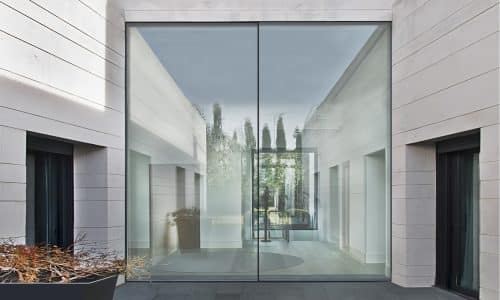
Structurally bonded sliding doors usually have a much thinner surround frame. Many models are designed for hidden fixing into the structure, making them seem even thinner.
Other types of bonded doors are only suitable for new build openings and not as a replacement for your old doors.

By comparison, non bonded doors have a visibly bigger surround frame that forms a ‘picture frame’ look.
It is still possible to hide the frame in the structure and make the doors look thinner, but overall the thicker profile sightlines remain.
The projecting 20mm mullion
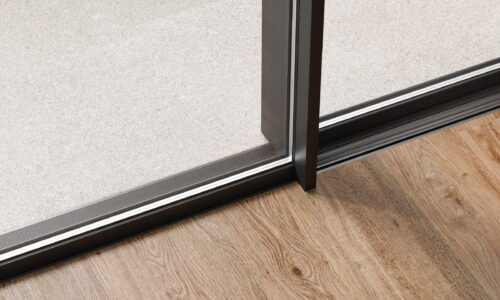
The 20mm mullion often needs to be deeper to provide the structural support, strength and integrity to the door frame.
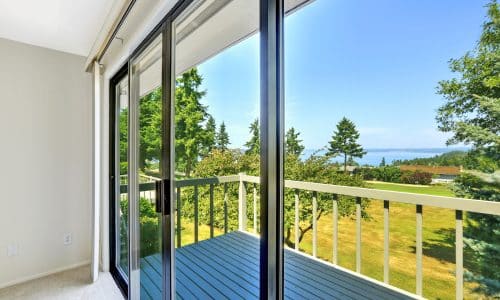
On a non-bonded door the mullion does not project and glazing beads are visible
The flush vs prominent door handles
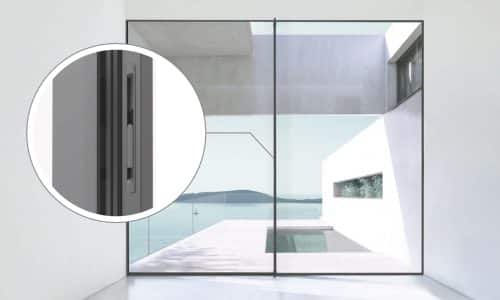
Bonded sliding doors tend to have hidden or flush door handles
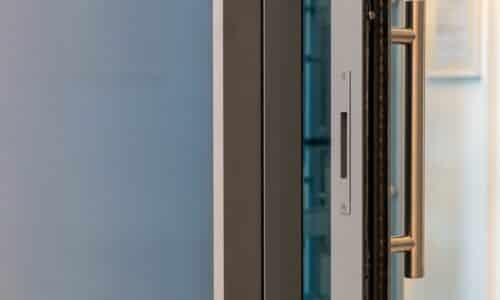
Dry glazed or partially bonded doors come with more prominent door handles
The Glazing Gaskets
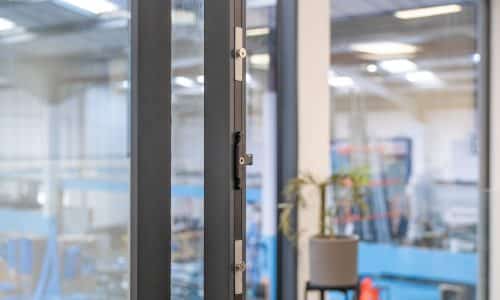
Bonded sliding doors show virtually no glazing gasket
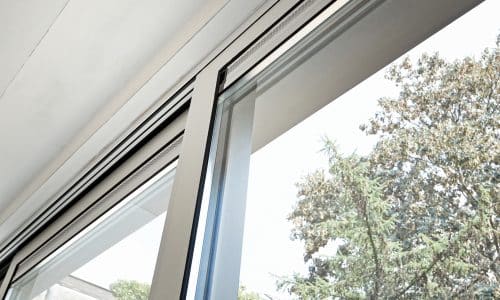
Dry-glazed show a more prominent glazing gasket usually black that creates a shadow line.
Thinner door top and bottom rails
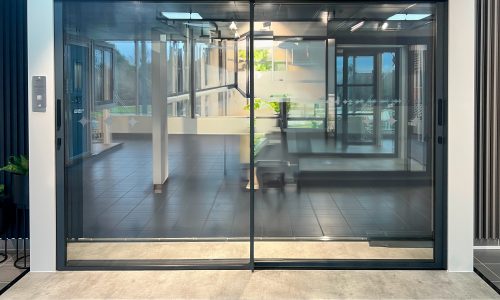
Bonded doors usually feature much slimmer sliding panel horizontal top and bottom rails. The outer frames are thinner as well.
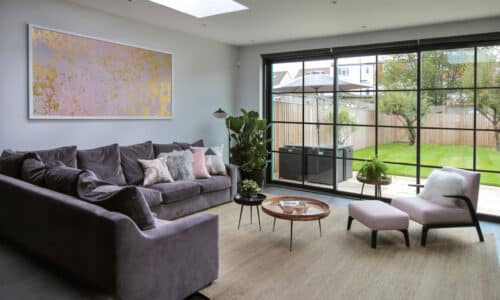
On dry-glazed and partially bonded doors, the horizontal rails are noticeably thicker as are the outer frames.
Ultimately, your installer should confirm whether the system is bonded. If in doubt, contact us for independent guidance.
Why you must consider the purchase of structurally bonded sliding doors carefully
When choosing a new sliding patio door for your home, sliding patio doors come in many different types and opening methods. Bonded sliding doors are arguably the most complex of these. Here are the pros and cons:
Pros of structurally bonded sliding doors
- Slimmest possible sightlines across the entire frame
- Central mullions as thin as 20mm
- Clean lines and discreet flush handles
- Excellent for minimal, modern aesthetics
- Often the only choice for large-format doors with floor-to-ceiling glass
- On-trend and very popular for home improvement projects, new extensions and new-build homes.
Cons of Structurally bonded sliding doors
- Doors are delivered fully glazed, often requiring lifting equipment and good site access
- Higher product, transport, and installation costs
- Not available as lift-and-slide systems
- Glass cannot usually be replaced without a new door panel
- Difficult or impossible to service without going back to the original supplier
- Colour mismatch risk if a panel is replaced years later
- Installer experience is critical—these are not systems for a general builder to fit
- Drainage design must be carefully considered
- More expensive than non-bonded doors
More complicated to make
These bonded doors are made around the glass unit using a special sealant that acts as a structural silicone joint and permanently joins the glass to the aluminium frame.
Once bonded, they need about 24 hours to set properly and create a sealed door panel that is strong, tight and weather resistant.
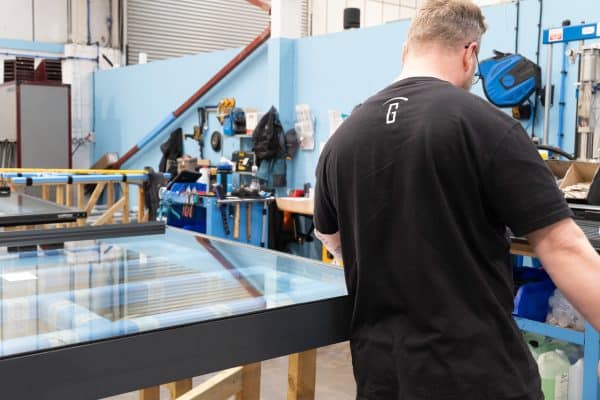
More complicated to install
Installing structurally bonded sliding doors is expensive and requires extra labour at your home, as well as specialist lifting equipment. This is because these doors are made in the factory, around the glass and come to your property as manufactured panels.
Most professional installers will ask about access through and outside your property to where the doors are being fitted. Depending on the door size, a crane may even be used to hoist the doors over the roof of your house. This process is not without it’s risks as well when the sheer weight of a very large set of sliding doors caused substantial damage to a house.
More complicated to service
These doors are also more complicated to work on should they require repair and especially if there is a problem with the glass. Because of the bonded nature, these doors are not as easy to service as doors that are glazed after they are fitted – or dry-glazed.
Should anything happen to the glass, a replacement glass unit also means replacing the entire sliding panel as well, because the glass in an integral bonded part of it. If you’re under warranty, a new panel will be supplied—but it may not match your existing panels exactly in colour or finish.
Dry-glazed doors are easier to put new glass in by a competent local glazier. Structurally bonded sliding doors may need to leave your home leaving you with a gap, boarding up and a security risk whilst you wait.
Even more complicated when out of warranty
If you’re out of warranty, there is a risk of significant extra costs. With many of these doors fitted with a hidden-frame method so they look even more frameless, there is a risk your existing plaster, render, or even flooring may be affected, especially if the door has to be removed and reinstalled. And if your doors are no longer available or discontinued, it’s likely you will have to replace the entire door set.
Why your choice of bonded doors depends on the supplier and installer
Doors like Cortizo are so popular now that they are available via most purchase routes. The best is the full supply and installation service ny one contractor. We would suggest you avoid buying these doors on the supply only route for your builder to fit. Installers must be fully trained with proven experience in these doors.
Additionallhy some of the claims made in some articles about the pitfalls of bonded sliding doors are only partially correct. Some manufacturers keep very accurate details of your doors, from the exact colour to the glass sizes, sliding panel size and every component used. As a result, they can just turn up at your home with a new panel and take away the old one.
Claims that a door no longer being available an you needing an new door set, literally applies to any discontinued product on the market, not just sliding doors.
It is sensible as a professional door and window website to highlight not just the benefits of a luxury slimline aluminium door but also the potential pitfalls. We absolutely recommend you go with these doors as long as you are aware of what could happen down the line. The best way to be covered within and out of warranty is to go with a reputable and expert installer and know who is manufacturing your doors and their reputation as well. With most of these doors still within their warranty period and new doors being sold all the time, only from 2027 onwards will we really know how easy structurally bonded sliding doors are to work with when the typical ten year guarantee has expired.
Competency and experience are essential when choosing these doors. Here is our advice:
- Choose an installer who has proven experience fitting these doors and more likely to be in business
- Buying direct for your builder to fit is best avoided and very risky
- The drainage and sealing of some bonded sliding door models is complex and needs expertise
- Avoid buying these doors at the lowest possible price or online
- Find out the manufacturer of your doors, not just the installation company.
The complexity of these doors makes it very important to understand how these doors work and—most importantly—who makes them. There are some bonded systems where the aluminium frame can be reused, but this depends entirely on the manufacturer and how the door is constructed.
What Are the Alternatives to a Structurally Bonded Sliding Door?
If the thought of having one of these superbly engineered, luxurious and beautiful doors is too daunting, there are semi-bonded or non-bonded/dry-glazed alternatives with the same 20mm, 25mm, or 30mm central mullion and none of the complexity.
Dry-glazed sliding doors use removable glazing beads, so the glass can be replaced without replacing the full panel. These systems typically have slightly chunkier frames, but still deliver a contemporary look and most of these are fantastic doors.
Semi-dry glazed systems offer the best of both worlds—slim sightlines with serviceable glass. These tend to be the most practical alternative for homeowners who want the look without potential complexity. These also tend to come from the longer established manufacturers for extra peace of mind.
Here are some alternatives and you can always get in touch for even more sliding door options for your project.
Schüco ASE 51 PD
The renowned Schüco brand name at a mid-range price, the Schüco ASE 51 PD is slightly thicker at the mullion, but an excellent all-round German-engineered and superb sliding patio door. Whilst not a bonded door as such, this is made around the glass and arrives glazed. However, there is no reason why Schüco/their network of dealers should not support this door well in the future thanks to an innovative system of support and traceability set up to ensure Schüco doors and windows last longer.
Alumil M450
The Alumil M450 benefits from pleasing contemporary sightlines, stylish door hardware and a very light, smooth and premium-feeling sliding action. Available as straight sliding or lift and slide, you can use this door both as a replacement for old patio door and for new build openings. It’s available in the UK under several brands and manufacturers, contact us for more information. With a 25mm interlock, this is a highly appealing alternative to bonded sliding doors and comes recommended.
Sunflex SVG 20 Sliding Doors
Beautifully made, luxurious, premium and only semi-bonded, Sunflex sliding doors are outsanding and highly recommended. There’s option of 20mm central mullion with the SVG 20 or 30mm mullion with the SVG 30, flush stacking, and superb overall styling.
Aston Architectural AS-20 and AS-25
Using re-engineered and upgraded Smart Systems profiles, these doors come non bonded up to 2100mm high for the AS-20 and only bonded at the central mullion which can be done on site. Even better, they carry their own security testing and have a lovely soft-close facility as well. Worth finding out more from Aston Architectural Aluminium.
Smart Systems Invisoglide Sliding Doors
The Invisoglide Sliding Door by Smart Systems finally brings a 20mm and 26mm slim mullion partially bonded door into Smart’s sliding door collection. Because this door is a Smart product, it will sell well and bring a mid-range bonded door into the popular sliding door space. Whilst late to the Slimline Party, it’s surprising the company couldn’t iron out the features we know homeowners don’t like, such as the excessive mullion projection into the room.
Origin OS-29+
Origin is a well-known name in aluminium doors and windows. The improved OS29+ has a 29mm mullion and a semi-bonded design. In our opinion and with the benefit of having seen and worked with so many other brands on the market, Origin’s sliding door offering is too expensive for what it offers. The 29mm sightline is misleading as it’s only in the middle (although Origin is not alone here), the track design is clumsily designed for what is marketed as such a premium product, and the sliding action is not that great for what is meant to be an improved product.
Some professionals online have also debunked the U-Value claims made. If you like Origin products, they’re well made, with a nationwide appeal, and by a highly reputable company. But in such a mature sliding door market, the truth is, there are numerous better and cheaper alternatives to Origin sliding doors today, that look, slide and feel more premium.
Important Questions to Ask When Choosing Structurally Bonded Sliding Doors
To be clear, we love these doors and if you do, then choosing a professional installer who uses an expert structurally bonded sliding door manufacturer will give you the most peace of mind.
The positivies of these doors are all great, but it does make sense to make you aware of whats involved in ownership, future servicing and repair.
Salespeople are unlikely to highlight the drawbacks of any product or how living with the product might affect you in the years to come. So here are key questions you should ask before choosing any sliding door:
- Is this a bonded sliding door?
- Who manufactures it for you?
- What happens if the glass fails during the warranty period?
- What happens if it breaks out of warranty? What will it cost?
- Can it be repaired on site or does the whole panel need removing and taking away?
- How will my home be secured if a panel is taken away?
More information and where to buy the best sliding doors for your home.
If you do choose a bonded door, make sure you know exactly who’s making it, who’s fitting it, and what your options are down the line. And if you’d prefer something simpler to install and maintain, there are excellent alternatives available which we can help you source.
The Door and Window Experts Website has been helping people find the best doors and windows from the right suppliers since 2010. Contact us today for help and advice with your residential or commercial project.

